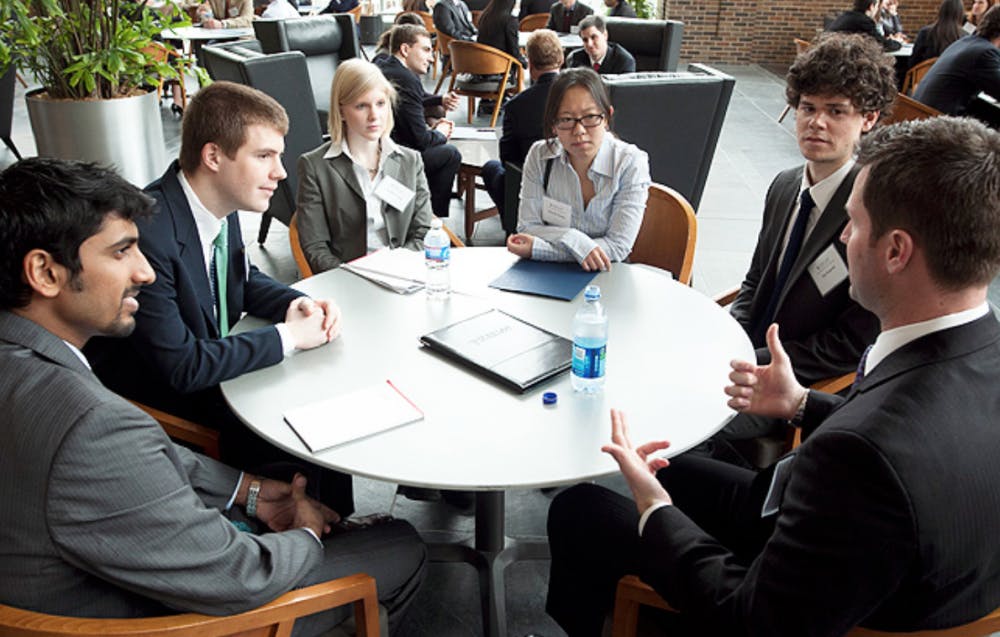Job fairs have never been my thing. As I walked around Wilson Gym in my suit last Wednesday, I was embarrassingly sweaty and incredibly flustered. I was afraid I would look stupid when I tried to talk to recruiters. I felt unqualified for most of the positions being advertised. I convinced myself that my resume wouldn’t stand out. And I was mad at myself for not having a better idea of what kind of job I wanted.
The beginning of my senior year has been a lot of stressing and a lot of reflecting. And looking at the mess that was my Wednesday morning, I am realizing that the reason career fairs and life beyond graduation are so intimidating to me is that I have been thinking about them the wrong way.
I am realizing that Duke has taught me to equate success with being the best. The goal seems to not be about being my best self, but rather about being the best, period. Part of this is my own fault—I would be lying if I said the prestige of the Duke name wasn’t a significant consideration in my decision to enroll. But I also think this emphasis on exceptionalism why many Duke students want to work for the biggest names in tech, intern at the most reputable banks, and attend the highest-ranked graduate schools. I am all for aiming for the top when the best companies and graduate schools can truly provide the best opportunities and prospects, and I would never slight anyone for doing so. But when the overriding desire to work somewhere is the name of the company and the inevitable “Oh, wow! Good for you!” reaction, I question whether the Duke culture has contorted what we perceive success to be.
I have been admittedly unsympathetic to my friends who are trying to decide whether or not to accept their return offers to big-name tech companies and consulting firms. When I see people landing positions at Google and McKinsey and Morgan Stanley, the “success = #1” mentality tells me they are succeeding more than I am. But this twisted standard shouldn’t make me bitter. These friends, like me, are trying to figure out which post-grad opportunity will contribute the most to their trajectories. It’s dumb for me to resent them for succeeding in the way they want to just because my narrative of success will likely be a different one.
In thinking about my own narrative, I am also realizing that I am putting unnecessary pressure on myself to figure out exactly how I want the entirety of my professional life to go. I don’t know where I got the idea that the ultimatum on self-discovery was my college graduation, but when I first came to Duke, I was sure I would have all of my interests and career goals figured out by the time I got my degree. Now, I am trying to learn that not only is it okay, but it’s actually probably better, that I have not mapped my entire life out.
One of the most valuable aspects of college for me has been the immense self-growth that has come with every new experience. Whether I loved it or hated it, every class, job or summer program has given me insight into my strengths, weaknesses and passions. By harnessing theses insights in my academic and extracurricular journeys at Duke, I’ve been able to gradually move closer to what I have found most fulfilling. If I land the perfect job right out of college, there is no room for that process of growth. Do I want to be doing something I love a year from now? Absolutely. But my goal should not be finding perfection: it should be discovering how I can inch toward what I perceive to be true fulfillment.
I am a planner and an overthinker by nature, so I am sure that no matter what, I will be stressed and overwhelmed about the job search until the day I start my next job. But somewhere in my brain, I know that things will work out, and that finding post-grad success is not a competition. I know that looking at job searching as finding my next opportunity for growth will serve me better than aiming for prestige or perfection. And if I have to take another walk around the gym in business formal to fully learn that lesson, then so be it.
Ethan Ahuna is a Trinity senior. His column runs on alternate Tuesdays.
Get The Chronicle straight to your inbox
Signup for our weekly newsletter. Cancel at any time.

